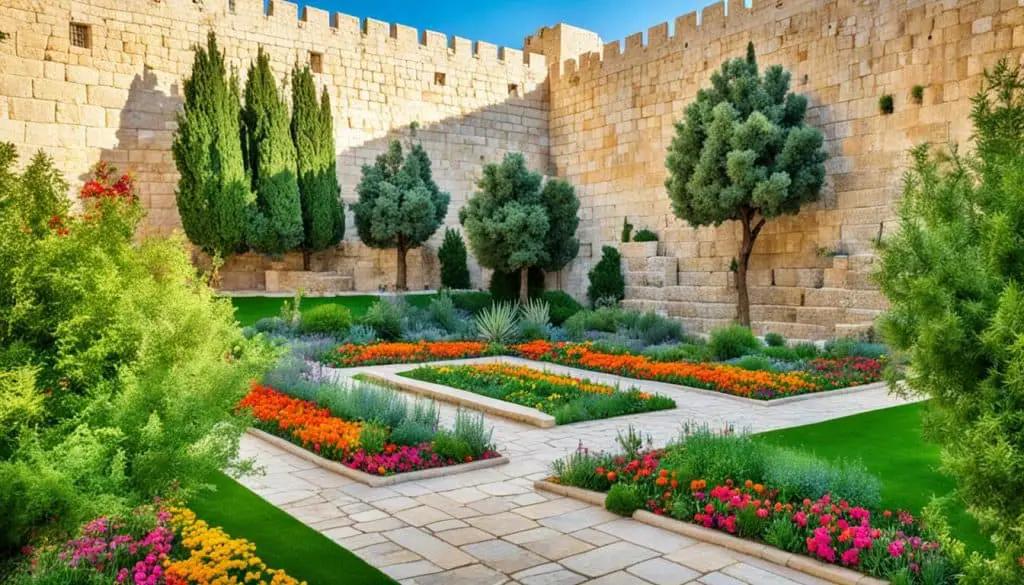Table of Contents
When we think of the Bible, we often picture kings, prophets, and disciples. But some were also known for their gardening. They cared for and worked the land in special ways, showing a deep connection to nature.
This article focuses on five biblical gardeners and what we can learn from them. Starting with Adam in the Garden of Eden, to the stories of sowing seeds in the Gospels. Their tales highlight how faith and caring for the earth are intertwined.
Are you curious about the Bible’s gardening connections? Let’s explore the gardening history of these well-known biblical figures.
Adam – The First Gardener in Eden
God put Adam and Eve in the Garden of Eden and asked them to look after it. Adam was the first gardener, taking care of paradise. This story is well-known and teaches us about taking care of nature and living in harmony with it.
As a gardener, Adam showed us how important it is to care for the land. He looked after all the plants and trees, helping them grow. Thanks to Adam’s work, the garden was a beautiful, fruitful place.
Adam demonstrated that working with nature can make great things happen. He showed how humans and nature can grow together. His efforts led to a thriving garden.
Even though the Garden of Eden was a perfect place, Adam’s work has a deeper meaning. It shows that we, as humans, have a duty to care for the earth. By cultivating the land, we can create a beautiful and sustainable world.
“In the sweat of your face you shall eat bread till you return to the ground, for out of it you were taken; for dust you are, and to dust you shall return.” – Genesis 3:19
This quote connects humans to the earth. It tells us that we are linked to the land in a very fundamental way.
Adam’s Garden of Eden – A Lush Paradise
The Bible describes the Garden of Eden as a lush paradise. It was full of greenery and life. The image below shows us what the Garden of Eden might have looked like:
| Plant | Description |
|---|---|
| Fruit trees | Bearing a variety of fruits, providing nourishment and sustenance for Adam and Eve. |
| Rivers | Flowing through the garden, providing water and nourishment for the plants and animals. |
| Flowers | Colorful blooms that add beauty and fragrance to the garden. |
| Vegetables | A patch of cultivated vegetables, offering a source of essential nutrients. |
The Garden of Eden symbolized a perfect connection between God, humans, and nature. It was a place without sin, where everything and everyone lived in perfect unity.
Adam’s work in Eden stresses the importance of taking care of the earth. It reminds us that we should protect and nurture the land. By doing so, we can help it thrive for the ones to come.
Cain and Abel – Tillers of the Ground
The stories of Cain and Abel in Genesis show their importance in the Bible. They worked the land and took care of animals. Genesis 4:2-3 tells us, “Now Abel was a keeper of sheep, and Cain a tiller of the ground.” This means Abel took care of animals, and Cain grew crops. Though we don’t know the details about what plants they grew, it’s clear they used the land for farming.
Cain – The Tiller of the Ground
Cain focused on making the earth produce. He worked hard to grow and harvest crops. His work shows the value of farming in ancient times.
Abel – The Keeper of Sheep
Abel took care of sheep. This involved giving them a safe place to live, somewhere to eat, and keeping them away from danger. He also made sure the sheep were well-looked after and their wool was cut when needed. This way, the flock could be strong and healthy.
Genesis 4:4 states, “And Abel also brought of the firstborn of his flock and of the fat thereof.” This shows Abel giving his best to God from his livestock. It reveals his deep respect and thanks towards God.
Even though Cain and Abel mainly farmed or raised animals, their work goes beyond that. It’s about using the ground to feed themselves and others. This shows the importance of farming and sharing the earth’s gifts.

The Significance of Cain and Abel’s Roles
By working the land and caring for animals, they showed responsibility. They helped feed their families and neighbors. This teaches us the value of hard work and looking after the earth.
What they offered God also tells a story. Abel’s gift was from his best animals. This was a sign of his deep respect for God. Cain’s gift was not received well. Many believe this was because his heart wasn’t in the right place. It shows that outward action and inner feelings both matter.
In the end, Cain and Abel’s farming and animal care work matter a lot. These stories are still important today. They remind us how working the land and taking care of what God made are very valuable.
King Solomon – Insights on Agriculture and Land
In the book of Proverbs, King Solomon shared a lot about farming and looking after the Earth. He isn’t directly called a farmer, but his sayings offer great advice for anyone working the land.
For example, in Proverbs 27:18, he mentions, “Whoever tends the fig tree will eat its fruit, and he who guards his master will be honored.” This shows how important it is to take care of land. It tells us we’ll be rewarded for working hard on our farms.
King Solomon uses farming stories to teach life lessons in many proverbs. For example, Proverbs 24:30-34 talks about a field left unattended as a warning against laziness. This makes his lessons not just for farmers but for everyone. Solomon connects farming with living a good life.
Solomon’s wisdom goes beyond just farming. He talks about working hard, looking after what’s given to us, and gaining from effort. This advice is especially meaningful to those who farm.
Solomon’s Wisdom in Proverbs
Let’s look at some of Solomon’s notable proverbs that focus on agriculture:
- “A sluggard does not plow in season; so at harvest time, he looks, and there is nothing.” – Proverbs 20:4
This proverb shows the need to work hard and on time. Skipping important work can lead to disappointment later. - “The plans of the diligent lead surely to abundance, but everyone who is hasty comes only to poverty.” – Proverbs 21:5
Solomon points out that careful planning and being patient bring success. Hurrying through work leads to bad results, but being diligent brings good things. - “The eyes of the LORD are everywhere, keeping watch on the wicked and the good.” – Proverbs 15:3
Although not directly about farming, this saying encourages honest and hard work. It’s a reminder that there’s always someone watching over us, which means we should work righteously.
Solomon’s proverbs offer insights and timeless wisdom for those who farm or work the land. He highlights the value of dedication, responsible use of resources, and keeping true to spiritual beliefs. His teachings apply to everyone working hard in different areas of life.
Nehemiah – Rebuilding and Gardens
The book of Nehemiah tells an exciting story about rebuilding Jerusalem. This was after many years of people living away. A special “water gate” is mentioned in Nehemiah 8:1. This makes us wonder if there were gardens near the walls.
Nehemiah was the governor of Judah at the time. He was determined to fix more than the walls. He wanted to renew Jerusalem’s meaning to its people. His leading role helped unite the community to rebuild the walls. This made the city secure and strong again.
“We will not abandon the rebuilding of the wall!”
Nehemiah was also keen on gardening. He tried to bring back Jerusalem’s heritage. The “water gate” hint at gardens close to the walls. These gardens would offer food, beauty, and peace to the city’s residents.
In many ways, gardens are important symbols of growth and renewal. Nehemiah’s effort with the walls and the gardens near them is key. It shows how looking after both physical and spiritual spaces creates vibrant communities.
Gardens: A Source of Inspiration and Nourishment
Imagine the joy of the people seeing lush gardens by the walls. They would see flowers, fruit trees, and well-kept green spaces. These scenes would remind them of God’s care and blessings.
Such gardens would have been an inspiration and a source of goodness for the city. They offer beauty and fresh food. They also provide a place for prayer and peace.

The Water Gate: A Gateway to Life and Vitality
The “water gate” in Nehemiah 8:1 adds to the gardens’ importance. Water is crucial for gardens’ life. It signifies purity and life renewal.
The gardens near the walls would mean life and renewal for the city. They would rejuvenate those tired from the rebuilding work. They remind people of God’s continuous support.
Nehemiah’s work on the walls shows his commitment to all of Jerusalem’s well-being. The connection to gardens at the water gate is unique. It shows the need to care for both the land and people’s spirits.
Thinking about Nehemiah’s task helps us see the importance of creating places that foster growth and beauty. Let’s draw inspiration from his work in building spaces that everyone can enjoy and feel part of.
The Parable of the Sower – Cultivating God’s Word
Jesus spoke the Parable of the Sower in the Gospels. This story is about a person sowing seeds. The seeds fall on different ground types – rocks, thorns, and good soil. Only the seeds on the good soil grow well. This shows how important where the seed lands is.
This parable teaches us a vital lesson about God’s word. The sower is like those sharing the message of the Gospel. God’s word is the seed. Just as a farmer gets the ground ready, we need to prepare our hearts and minds. This helps us to really hear and understand God’s word.
When we truly understand God’s word, it changes us for the better. Like good soil, we’re open and receptive. We get to grow and share God’s truth with the world. By living like Jesus and telling others about Him, we help grow God’s work. This spreads love and grace to everyone around us.




